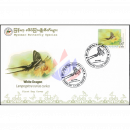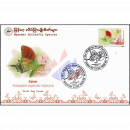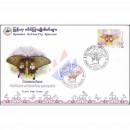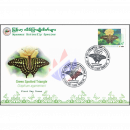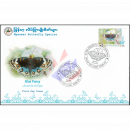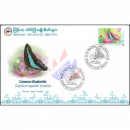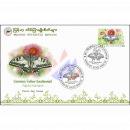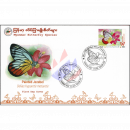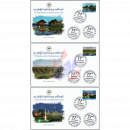Description
Opr. (10x5); A = perf. K 14 1/4:14; B = imperforated
FDC(I), issue date: March 19, 2025
Picture descriptions:
np) Red Lacewing (Cethosia biblis)
572 A 200 K multicolored no
Quantity FDC(I): 1,000 pieces
Designer: Myanmar Post
Printer: Security Printing Works (SPW), Rangoon
Conservation Status:
Here as a FDC (Version I) with perforated Single Stamp and first day cancellation
Issue Notice:
- Cethosia biblis, syn.: Papilio biblis, also known as the Bordered Edge butterfly, is a butterfly in the subfamily Heliconiinae within the family Nymphalidae. It owes its scientific name to the pattern on the underside of its wings, which resembles the writing on a book ("biblis" Latin for book).The wingspan of this curved-toothed butterfly is 80 to 90 millimeters, or 60 to 70 millimeters, depending on the source.
- The underside of the forewing is orange-red in the inner part and contains three white and black bands. The outer part is orange-yellow and spotted with white and black. A white band runs down the center, bordered by individual black lines. A white, jagged line runs along the edge of the wing against a dark background. The underside of the hindwing is orange-red in the inner part, with a yellow band bordered by black lines. The outer part of the wing is orange-yellow with a white band and black spots. The white, jagged line continues along the wing edge against the dark background of the forewing.
- Males are bright orange-red above. On the forewing, they have a broad brown border along the wing edge and white V-shaped markings. The wing tip is black, and a white jagged line runs along the edge, which is also visible on the underside.
The hindwing is orange-brown to orange-red, turning black towards the wing edge. Here, too, the characteristic white jagged line runs along the wing edge, as well as a row of black spots. Additional black spots are also found on the inner part of the wing. - The females, on the other hand, are significantly browner or olive-green, often paler in color. The bright coloration is intended to deter potential predators, as the butterflies are poisonous.

